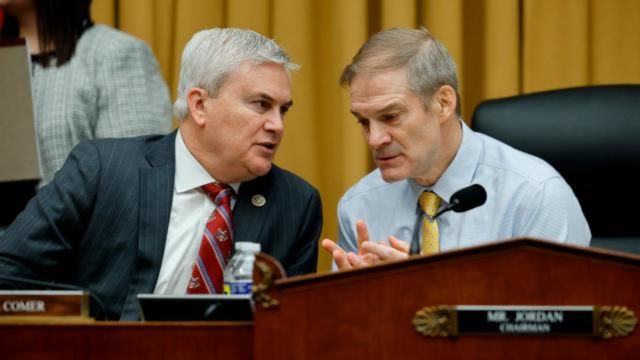The Justice Department notified House Republicans on Monday that it does not intend to provide them with an audio recording of President Joe Biden’s interview with former special counsel Robert Hur. This decision comes in response to GOP threats of holding Attorney General Merrick Garland in contempt for withholding the records.
“We are committed to fostering cooperation and demonstrating our dedication to working together for the betterment of the American people,” emphasized Carlos Uriarte, a senior official at the DOJ, in a letter sent on Monday to Jim Jordan and James Comer, the chairmen of the House Judiciary and Oversight Committees. “Despite our efforts, however, the Committees have chosen to escalate the situation and make threats of criminal contempt.”
Jordan and Comer requested the audio recording of Biden’s interview after Hur’s report was published in February. The report not only investigated Biden’s handling of classified materials while he was not in office but also revealed embarrassing information about his age and memory lapses.
After a thorough yearlong investigation, Hur ultimately determined that there were no grounds for criminal charges in the case. He defended this decision during a hearing on Capitol Hill last month.
During his testimony before Congress on the matter, Hur also disclosed that the complete transcript of Biden’s interview had been released to the House Judiciary Committee by the administration.
Comer and Jordan persistently urged the DOJ to provide the audio recording of the interview, along with the transcript and audio recordings of Hur’s interview with Biden’s ghostwriter, Mark Zwonitzer.
The Department of Justice (DOJ) announced on Monday that it will be sharing transcripts of Zwonitzer’s interviews with the House. However, they will not be releasing the audio recordings. The DOJ’s reasoning for this decision is that it believes releasing the audio could discourage future witnesses in special counsel investigations from providing the same level of cooperation that both Biden and Zwonitzer have demonstrated.
Uriarte explained that the Committees have already received the transcripts, which provide the necessary information. He emphasized that producing the audio files would make it more difficult for future prosecutors to obtain such cooperation.
Uriarte expressed concern that obtaining consent for interviews may become more difficult due to the potential decrease in cooperation with prosecutors and investigators. He emphasized that it is essential to maintain the public’s interest in facilitating such collaboration moving forward.
In a statement on Monday, Comer expressed his opposition to the Department of Justice, asserting that the Biden Administration does not have the authority to dictate what information Congress requires for its oversight of the executive branch.
According to Comer, “The American people deserve to hear the actual audio of his answers.”
“We will soon provide a formal response,” stated the committee chairman.
Jordan and Comer have not yet indicated whether they will move forward with initiating contempt proceedings against Garland.
During his testimony last month, Hur highlighted the significance of both the transcript and audio of his interview with Biden in guiding his decision not to pursue criminal charges against the president. When questioned by Rep. Jordan about whether Congress should have access to audio recordings linked to his report, Hur refrained from expressing a specific opinion.



